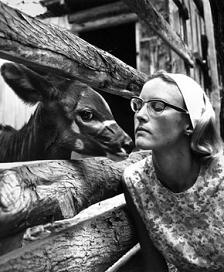A tribe in trouble -The short sad life of whites in Africa
The Economist

Two compelling documentaries illuminate the dilemmas facing Africa’s dwindling white tribes. One is set in Zimbabwe, the other in Kenya. The Zimbabwean film, “Mugabe and the White African”, is the more straightforward and should be shown as widely as possible to help end one of Africa’s great tragedies: the ruin of one of the continent’s most successful countries and the moral bankruptcy of the governments of the nearby states (bar plucky Botswana) for failing to isolate and oust a vile dictator.
It shows how a brave film company, embedding itself with a beleaguered family of white farmers off and on for a year, can bring to life the horrors that have befallen an entire country. Like the large majority of the 5,000-odd white farmers who stayed on after Robert Mugabe became prime minister in 1980 and later president, Mike Campbell and his son-in-law Ben Freeth acquired their farm and the regulation government certificate showing that no black citizen also sought to buy the same farm, which then became Zimbabwe’s largest producer of mangoes and employed 500 locals. When a man with ministerial connections claimed the property for himself a few years ago, Messrs Campbell and Freeth refused to go, prompting a campaign of intimidation, arson and assault, including the beating up not just of the two farmers but also their wives, all horrifically shown on screen.
When they took their case to a tribunal of the Southern African Development Community, a 15-nation club including both Zimbabwe and South Africa, and won, Mr Mugabe’s thugs ignored the verdict and burned down the farmsteads. Much of this is covertly filmed, sometimes by the farmers themselves, with wobbly camera shots enhancing the sense of chaos and terror. It is impossible to watch without feeling sympathy for the farmers and their loyal but terrified black workers, and revulsion for the barbarities of Mr Mugabe’s regime. A shocking postscript is that, although the film is to be screened on British television's Channel 4, no cinema in neighbouring South Africa, which could stop Mr Mugabe in his tracks, has yet seen fit to air it.
The Kenyan film, “Murder on the Lake”, is more intriguing and complicated. Already screened on the BBC and elsewhere, it looks at the murder in 2006 of a famous wildlife photographer, Joan Root (pictured), who was shot in her home beside Lake Naivasha, the centre of Kenya’s flower industry. The film offers a tangled web of whodunnit theories. What is certain is that in the last decade of her life, Mrs Root set up a local task force to wage a harsh but ecologically admirable campaign against fish poachers destroying the lake’s resources. When she was made to disband the force, some of its aggrieved members turned against her. But she had made other enemies along the lake. It has never been clear who killed her.
The film shows the ecological and social turmoil of modern Kenya: the success of horticulture on the lake’s edge, at a cost of draining the lake’s waters; the growth of the riparian village from a one-horse town to a seething metropolis of 350,000 in a couple of decades, creating tribal tension and mass poverty in burgeoning slums; the greed and corruption of politicians and police; and the resentment of many locals who feel that white conservationists care more about wild animals than people. Above all, it highlights the awkwardness of the role of the engaged white person in the midst of a society that is still, in many respects, at odds with Western norms.
Is there room for the Joan Roots, let alone the Mike Campbells, in modern Africa? One hopes so. Africa needs both of them. But, judging by this pair of films, one cannot, in the long run, be too confident.
___________________________________________________________________________________
Source: http://www.economist.com/culture/PrinterFriendly.cfm?story_id=15603730
























